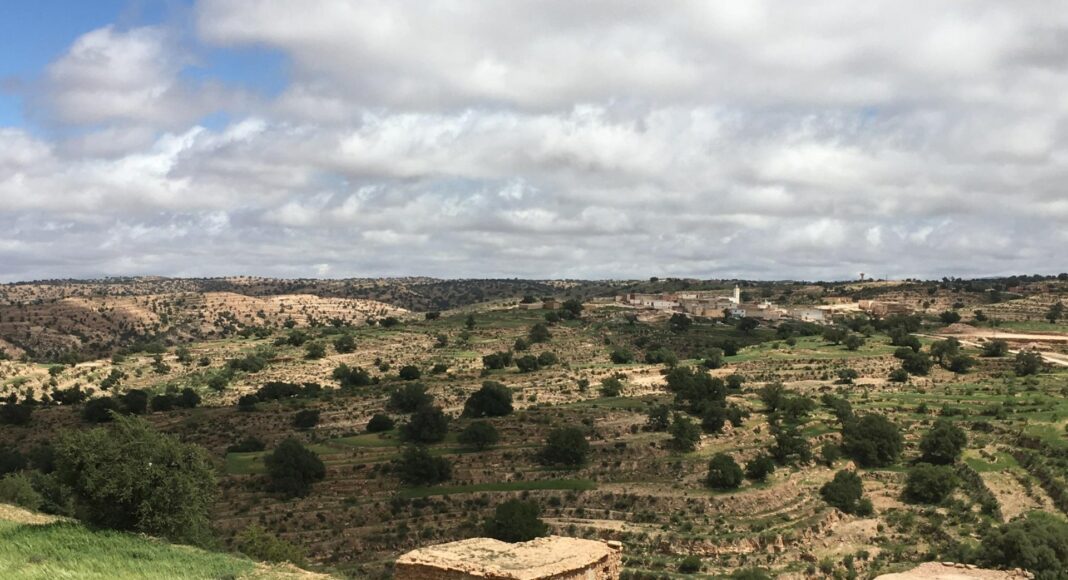When I was a child, we used to travel to the Atlas Mountains to visit my grandparents’ village, Azgayoud. It was a magical place: the towering peaks, the rugged terrain, and the forests of argan trees; the small one-storey houses made from mud and rocks, blending seamlessly into the sandy landscape; the outside ovens churning out the tastiest, most aromatic Tafarnout bread; the community gatherings of women cracking argan nuts to prepare argan oil, the “liquid gold” of the Atlas while singing old Amazigh songs; and, of course, the gravity-defying mountain goats, jumping on roofs, fences and trees.
My grandparents’ house captured, for me, the essence of Atlas life. It stood as a haven where time seemed to pause. Its wooden door, adorned with a hefty knocker, remained always open, welcoming all. Its courtyard, featuring a well with the freshest water, hosted family and friends who rested in the shade, sipping tea.
Through the eyes of a child, this place looked like paradise: People had a simple and happy life, enjoying the abundance that living in harmony with nature granted them. But as I grew up, I came to realise that many Amazigh communities like my grandparents’ were facing severe hardships.
Many villages in the mountains lacked paved roads, running water, and proper access to health care and sanitation. Limited electricity supply and weak mobile signal would often cut off communication with the rest of the world. Lack of access to proper education and economic opportunities would force many young people to leave for bigger cities in the north or emigrate to Europe. These communities were largely left on their own.
On September 8, a powerful earthquake multiplied the misery and hardships of the region countless times. The disaster killed more than 2,900 people and injured at least 5,530.
When I heard the news, I immediately called my parents in Taroudant, a city nestled in the southern slopes of the Atlas Mountains. They reassured me that they and the rest of the family were safe and well. They had felt the tremors, but their houses had withstood the shock.
But up in the mountain, my grandparents’ village had suffered some damage. Elsewhere, whole communities had been wiped out.
It was painful to hear the stories of death and devastation from family and friends. Isolated and cut off from the world, many villagers have had to dig people out of the rubble with their bare hands. Having lost their homes and grieving for their dead loved ones, many have had to sleep out in the open, as temperatures drop to 10 degrees Celsius (50 degrees Fahrenheit) at night. Women and children who have lost other family members now face the risk of exploitation by human traffickers.
Rescue efforts have been slowed down by the rugged terrain and rockslides. Trucks carrying humanitarian aid have found it difficult to make their way on narrow mountainous roads, while medical staff and rescuers have struggled to evacuate the injured to the nearest medical facilities.
The local hospital in Taroudant, which serves dozens of rural communities, was overwhelmed. I have heard harrowing accounts of how the hospital and its dedicated staff were struggling to cope with the influx of injured and deceased people in the first few days.
Still, there has been a huge mobilisation of people to help each other out. Organising on social media, volunteers have been gathering essential items such as tents, mattresses, blankets, baby food, hygiene products, and more and distributing them to destitute villagers. But this assistance will get homeless families only that far, especially as winter is approaching.
A week after the disaster struck, the fear is that as the international media spotlight moves away, these people will once again be forgotten. And this is already happening. The floods in Libya that have taken the lives of more than 11,000, have topped the news agenda and Morocco’s earthquake disaster has slipped off the front pages.
There are, of course, some areas affected by the earthquake that will be taken care of. Marrakech and its UNESCO World Heritage site will likely see the bulk of aid and reconstruction assistance. Communities in the Atlas Mountains do not have this internationally recognised label to draw attention to their heritage.
According to local media reports, important historical monuments, such as the 12th-century Tinmel Mosque, lie in ruins; they are at risk of being lost forever. But even more importantly, a whole way of life, preserved in the heights of the Atlas Mountains, will be in danger, if the region does not receive proper assistance.
The devastation caused by the earthquake will undoubtedly lead to an exodus of people from the region in search of a new home. Whole villages may die out as a result. Depopulation could disrupt the preservation of Amazigh traditions, trades, customs, folklore and even local dialects.
This region has safeguarded a unique culture and language for more than 3,000 years, and it holds deep significance for many Amazigh people. To survive this calamity, these communities require urgent and comprehensive assistance.
The people of the Atlas Mountains have faced isolation and hardship for centuries and endured. Theirs is a story of strength and determination, of a culture that persists in the face of adversity. But this earthquake will tear their communities apart unless we help them.
The views expressed in this article are the author’s own and do not necessarily reflect Al Jazeera’s editorial stance.



